Nearly two thirds of Dundee residents say they are “comfortable” at the thought of a hike in council tax rates when the council sets its budget next month.
Dundee City Council has warned it will have to find ways to save £19.4 million when it agrees its spending plans on February 21.
The local authority carried out a public consultation in November and December to ask residents what they think its priorities should be in 2019/20.
Of the 1,171 people who responded, two-thirds indicated they would be happy to see council tax bills rise.
Residents were also quizzed on a range of money-saving measures and put education and older people’s services at the top of the list of services they would most like to see maintained. Selling off redundant property was the most popular idea for cutting costs.
A 1% council tax increase was supported by 21.1% of respondents while 18% said they believe a 2% rise is preferable.
Councils are allowed to raise bills by a maximum of 3% and 17.7% of respondents supported this level of increase.
Another 8.4% of people said bills should rise by an even greater amount.
Just over a third of people – 34.8% – said they did not want to see council tax bills rise at all.
A report presented to councillors earlier this month said the local authority is likely to have to find savings of £19.4 million next year.
Increasing council tax by 3% will only raise £1.5 million of additional income so if the maximum increase is applied nearly £18 million of savings will have to be found elsewhere.
Regarding ideas to save money, the survey asked respondents to rate how strongly they agreed or disagreed with proposals on a scale of one to 10, where one indicated “totally disagree” and 10 meant “totally agree”.
The statement “the council should continue to sell the property it no longer has use for” had an average agreement rating of 8.2, the highest of all options put forward.
Reviewing how much the council charges for service had an agreement rating of 5.7, as did changing or reducing the opening hours of some public buildings.
The city council reducing or stopping some non-statutory services had an agreement rating of 5.4.
Respondents were also asked to rate what services were most important to them on a scale of one to 10, where 10 is the most important.
Education came top with an average rating of 8.3, followed by older people’s services (8) and planning, job creation and regeneration (7.9).










